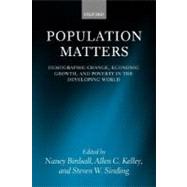Population Matters Demographic Change, Economic Growth, and Poverty in the Developing World
, by Birdsall, Nancy; Kelley, Allen C.; Sinding, Steven- ISBN: 9780199261864 | 0199261865
- Cover: Paperback
- Copyright: 7/3/2003
The effect of demography on economic performance has been the subject of intense debate in economics for nearly two centuries. In recent years opinion has swung between the Malthusian views of Coale and Hoover, and the cornucopian views of Julian Simon. Unfortunately, until recently, data weretoo weak and analytical models too limited to provide clear insights into the relationship. As a result economists as a group have not been clear or conclusive.This volume, based on a collection of papers that heavily rely on data from the 1980s and 1990s and on new analytical approaches, sheds important new light on demographic-economic relationships, and it provides clearer policy conclusions than any recent work on the subject. In particular, evidencefrom developing countries throughout the world shows a much clearer pattern in recent decades than was evident earlier: countries with higher rates of population growth have tended to see less economic growth. An analysis of the role of demography in the "Asian economic miracle" strongly suggeststhat changes in age structures resulting from declining fertility create a one-time "demographic gift" or window of opportunity, when the working age population has relatively few dependants, of either young or old age, to support. Countries which recognize and seize on this opportunity can, as theAsian tigers did, realize healthy bursts in economic output. But such results are by no means assured: only for countries with otherwise sound economic policies will the window of opportunity yield such dramatic results. Finally, several of the studies demonstrate the likelihood of a causalrelationship between high fertility and poverty. While the direction of causality is not always clear and very likely is reciprocal (poverty contributes to high fertility and high fertility reinforces poverty), the studies support the view that lower fertility at the country level helps create apath out of poverty for many families.Population Matters represents an important further step in our understanding of the contribution of population change to economic performance. As such, it will be a useful volume for policymakers both in developing countries and in international development agencies.







